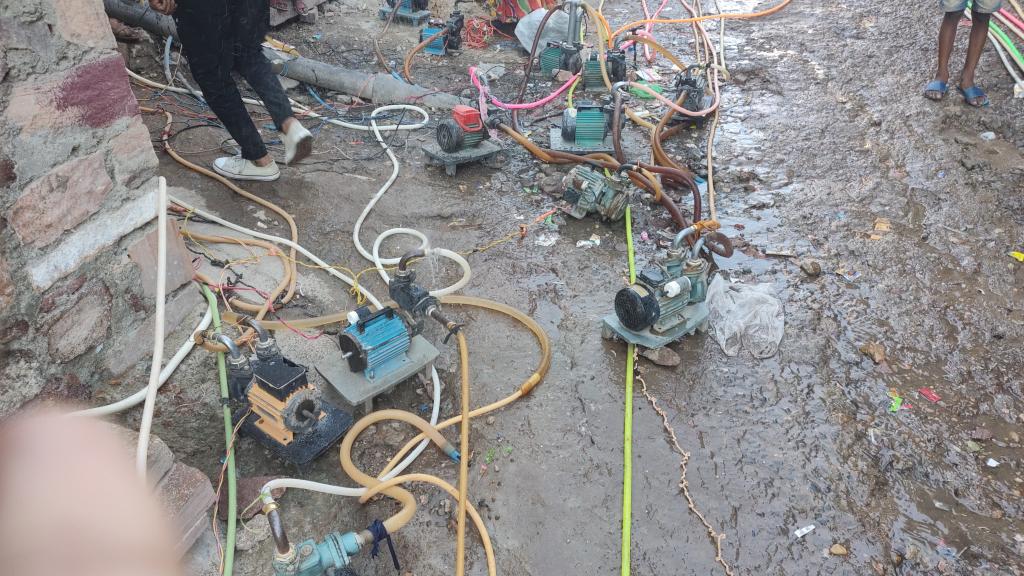

Only downhill houses have water connections, others walk for several kilometres or are forced to use plastic pipes, pumps



The lives of around 2,000 households in a Rajasthan settlement near Jodhpur city revolve around water. Jhalora basti, also known as Badi Bhil basti, is situated on an incline and only the houses downhill get water by a pipeline. This means most homes lack access to the tapped water supply, pushing them to look for alternatives daily.
The houses in the uphill part of the settlement are forced to pump the water using plastic pipes attached to the main line.
The writer visited Jhalora basti at the end of November 2022 and found the pipes attached to the homes with water connection. The vital two hours of supply had everyone in the settlement scrambling.
Read more: Rooftop rainwater harvesting: A tool for refashioning India’s water management praxis
Households that can’t afford pipes, pumps or electricity are compelled to walk downhill and collect water manually. The site area was filled with women and children carrying water on their heads, passing through the entangled pipes and low-hanging electric wires.
A single trip to and fro varies from approximately 1-3 kilometres and each person interviewed mentioned making at least two trips. The situation has been the same for the last ten years, said village resident Parvati as her daughter filled water containers.
“I’ve been living in this colony for the last 25 years. Water has always been a challenge. At least now we own a pump, so we don’t have to walk like most others. We have raised demands for a water pipeline to the relevant governmental departments too, but never heard back,” she said.
The situation was manageable in November, but getting even a bucket of water in summers was tough, she added.

Households that can’t afford the cost of pipe, pump or electricity are compelled to go downhill and collect water manually. Photo: Anuj Behal
The extended pipes are as long as 100-150 feet, said Sanoj, another colony resident. “We don’t know how long we have to depend on these lines. The authorities concerned are not bothering to dig water pipelines. Living in a colony for 20 years doesn’t seem enough to get a pipeline,” he said.
Sanoj works as a rickshaw driver but ensures he returns home during supply hours. “My wife can’t set up the pipe and wiring on her own. So I have to be around during the supply hours. This impacts my livelihood too. Even children in our colony have to leave their play/study to collect water,” he added.
Read more: Rethink usefulness of trading water: UN human rights expert
During the limited supply time, households in the Jhalora basti make the most out of it. This means presetting the system at least four hours in advance and making the long walk trips. “Every day of our lives revolves around water,” said Sanoj.
As per the 2011 census, nearly 40 per cent of India’s urban households have no access to the public water supply and have to depend on other water sources.
Moreover, not all families with access to supply have access to it within their premises. Only 49 per cent of households have access to piped water supply within their premises.
Access to safe water remains a vexing issue for the urban poor at the bottom of the pyramid. In the absence of public services, households depend on multiple sources of water.
This can range from procuring water from private players, difficult-to-access provisions like water tankers by public utilities or attaching extended plastic pipes to existing lines.
Most of the urban poor like Sanoj or Parvati are forced to buy hand pumps or borewells with submersible pumps through the use of often unauthorised power connections.
Read more: Government must prioritise on conserving water
In the Indian context, though the right to water is not explicitly mentioned in the Constitution, there is judicial support for it under Article 21, the right to life.
Realising the right to water for people living in slums for their basic water needs for dignified life is fraught with multiple complex challenges.
Till the government recognises this right or finds a way to implement it, the poor urban communities will continue to struggle to access the already scant resource in the thirsty cities of India.
We are a voice to you; you have been a support to us. Together we build journalism that is independent, credible and fearless. You can further help us by making a donation. This will mean a lot for our ability to bring you news, perspectives and analysis from the ground so that we can make change together.

Comments are moderated and will be published only after the site moderator’s approval. Please use a genuine email ID and provide your name. Selected comments may also be used in the ‘Letters’ section of the Down To Earth print edition.